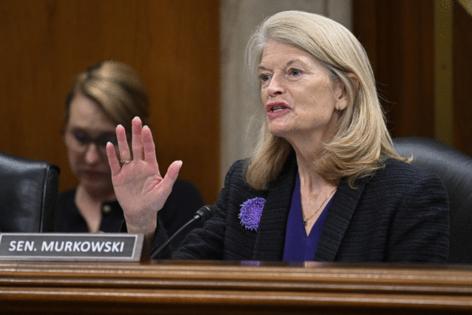Last-minute effort by Senate GOP to amend budget reconciliation bill in favor of Alaska hits roadblocks
Published in Political News
As the U.S. Senate took up consideration of a budget reconciliation bill over the weekend, changes impacting Alaska were front and center.
Provisions aimed to boost support for the measure in Alaska failed a critical procedural hurdle, but could be resurrected as the Senate takes up marathon voting on the bill Monday amid a GOP effort to get it across the finish line by a self-imposed July 4 deadline.
Republican leaders had amended the bill Saturday to include several changes to benefit Alaska, in an effort to gain yes-votes from Alaska's U.S. Sen. Lisa Murkowski, who had said cuts to Medicaid and food assistance would not work in the state.
One in three Alaskans rely on Medicaid and one in 10 rely on the Supplemental Nutrition Assistance Program.
The budget reconciliation bill primarily seeks to extend tax cuts first passed during President Donald Trump's first term in office. The tax cuts, which disproportionately benefit the wealthy, are so expensive that even after cutting more than $1 trillion in spending on health care, the bill is still expected to add $3.3 trillion to the national deficit over the coming decade, according to a nonpartisan estimate from the Congressional Budget Office.
To win over support from Alaska's delegation, the bill was changed over the weekend to include an increase in the share of Alaska's Medicaid program paid with federal funds.
That measure was set to cost the federal government $6 billion over the coming decade.
But soon after the Senate cleared a procedural vote — with support from Murkowski and U.S. Sen. Dan Sullivan — the Senate parliamentarian found that the change to the bill violated Senate rules. Those rules prevent the Senate from using a reconciliation bill to pass provisions unrelated to budgetary issues.
Murkowski and Sullivan had been tight-lipped about the Alaska-specific changes they were seeking to the bill ahead of a Senate vote, declining multiple interview requests from Alaska reporters even as they were hounded by national correspondents in the Capitol hallways.
But after the parliamentarian nixed the Alaska-specific Medicaid funding increase, Sullivan took to social media to rail against Democrats.
"The Parliamentarian only rules on provisions in the bill that the opposing party challenges," Sullivan wrote on social media Monday, pointing out that Hawaii — which has an all-Democratic congressional delegation — would have also benefited from the federal Medicaid match boost.
Congressional Democrats uniformly oppose the budget reconciliation bill, saying it would take away health and food benefits from Americans in order to maintain tax cuts that primarily benefit the rich. Even with the increased federal Medicaid match for Alaska and Hawaii, new eligibility requirements backed by Republicans — including Sullivan — were expected to reduce the number of Medicaid enrollees.
Still, Sullivan wrote Monday that "the only party cutting Medicaid dollars for Alaska is the Democrat Party."
Sullivan called Democratic Senate leadership "hypocrites" in a Sunday post for celebrating the removal of the provision, which would have increased federal spending on Alaska's Medicaid program even as the bill would cut hundreds of billions of dollars from Medicaid spending across the country, eliminating health insurance for more than 11 million Americans, according to a nonpartisan analysis.
"The national party openly cutting hundreds of millions of dollars of Medicaid funding for Alaska is the Democrats. That happened today. But the fight isn't over," Sullivan wrote on Sunday.
The Senate parliamentarian had also determined that a provision boosting Medicare rates for hospital services in Alaska and Hawaii does not comply with Senate rules. That would have cost $700 million over 10 years.
Other Alaska-specific provisions added to the bill include an increase in the tax deduction for Alaska whaling captains and new tax exemptions for fishermen in Western Alaska.
New oil and gas lease sales in the Arctic National Wildlife Refuge and the National Petroleum Reserve-Alaska, mandated under the bill with proceeds split between the state and the federal government, were projected to net the federal government $700 million in the coming decade.
If the Senate succeeds in passing the bill, it must still be approved again by the U.S. House, where Alaska's lone member, Rep. Nick Begich, has favored a version of the legislation that was expected to remove Medicaid coverage for thousands of Alaskans.
_____
© 2025 the Alaska Dispatch News (Anchorage, Alaska). Visit www.adn.com. Distributed by Tribune Content Agency, LLC.

























































Comments